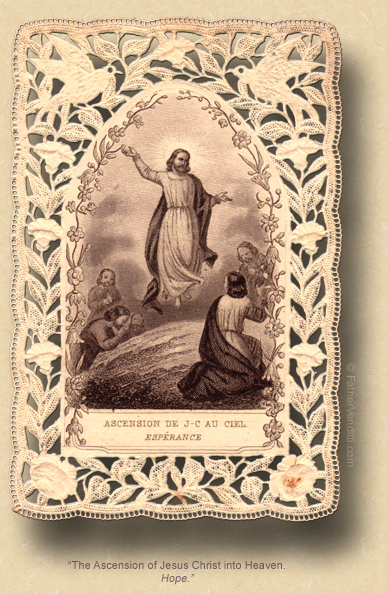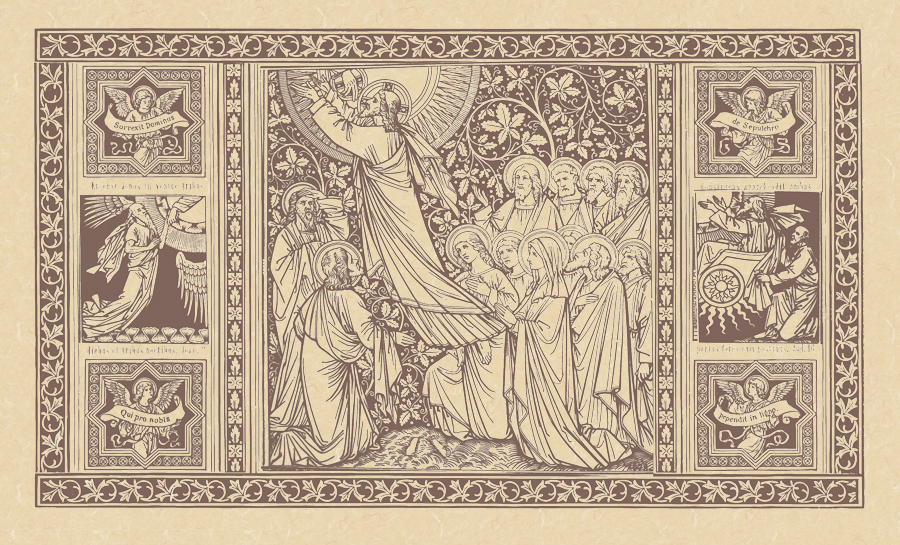Keep Your Eyes on the Prize.
Where the Ascension is transfered to the Sixth Sunday of Easter:
The Solemnity of the Ascension of the Lord.
Lessons from the secondary proper,* according to the ordinary form of the Roman Rite:
• Acts 1: 1-11.
• Psalm 47: 2-3, 6-9.
• Ephesians 1: 17-23.
[or, Ephesians 4: 1-13.]
[or, Ephesians 4: 1-7, 11-13.]
• Mark 16: 15-20.
|
Where the Ascension was observed on the previous Thursday:**
The Seventh Sunday of Easter.
Lessons from the secondary dominica, according to the ordinary form of the Roman Rite:
• Acts 1: 15-17, 20-26.
• Psalm 103: 1-2, 11-12, 19-20.
• I John 4: 11-16.
• John 17: 11-19.
|
The Sunday after the Ascension.***
Lessons from the dominica, according to the extraordinary form of the Roman Rite:
• I Peter 4: 7-11.
• [The Gradual is omitted.]
• John 15: 26, 27; 16: 1-4.
|
 11:08 AM 5/13/2018 — I was in the seminary with men who were being trained for a number of dioceses around the country; so, in the first few years of my priesthood I had occasion to attend ordinations all over the country. Some of my closest friends in the seminary came from a diocese out in the midwest. The last time I was there was not too many years ago to witness one of my schoolmates enthroned as the bishop there. It was a very surreal event because he is very traditional—he frequently offers the Traditional Latin Mass and encourages his priests to do the same—but his cathedral there was built back in the early ‘70s by a bishop who was very much the opposite of him in temperament, so the church is very modern. Bolted on the wall behind the main altar there is a bronze figure of of the Risen Christ. In looking at it, the intention of the artist was quite clear: he wanted to provide the people of that region with an image of Christ that would be relevant to their daily lives. Now, I'm no art critic, but in my opinion he failed miserably. He knew that the principle industry of the region was corn farming, and he knew that corn meant sustenance and prosperity, so he sculpted an image of Christ rising triumphantly out of an ear of corn. We used to flippantly refer to it as the Creature from the Black Lagoon, because that’s sort of what it looks like. 11:08 AM 5/13/2018 — I was in the seminary with men who were being trained for a number of dioceses around the country; so, in the first few years of my priesthood I had occasion to attend ordinations all over the country. Some of my closest friends in the seminary came from a diocese out in the midwest. The last time I was there was not too many years ago to witness one of my schoolmates enthroned as the bishop there. It was a very surreal event because he is very traditional—he frequently offers the Traditional Latin Mass and encourages his priests to do the same—but his cathedral there was built back in the early ‘70s by a bishop who was very much the opposite of him in temperament, so the church is very modern. Bolted on the wall behind the main altar there is a bronze figure of of the Risen Christ. In looking at it, the intention of the artist was quite clear: he wanted to provide the people of that region with an image of Christ that would be relevant to their daily lives. Now, I'm no art critic, but in my opinion he failed miserably. He knew that the principle industry of the region was corn farming, and he knew that corn meant sustenance and prosperity, so he sculpted an image of Christ rising triumphantly out of an ear of corn. We used to flippantly refer to it as the Creature from the Black Lagoon, because that’s sort of what it looks like.
The obvious fact of human nature that the artist totally forgot was that the familiar, while certainly relevant, is not uplifting. For a corn farmer who has spent his whole week in the hot sun wading among ears of corn, the last thing in the world he wants to see when he walks into church is another ear of corn, especially when the ear of corn is pretending to be his God. It's relevant, certainly, but in the wrong way.
This is, I think, the most important lesson we learn from celebrating our Lord's bodily Ascension into heaven: that no matter how hard we try to make our faith practical and down-to-earth, the simple fact is that to be a Christian means to live in hope of another life which is very different from this one. In ascending to his heavenly Father, the Lord Jesus has given us hope. There he sits, at the right hand of the Father, ready to plead our cause on the day of judgment. And there he is in heaven with a room waiting just for us, one with our name on it.
Of course, all of us would like to live a happy and carefree life, and we'll probably never stop striving to make that happen, which is why we're always looking to improve our situation, searching for the right job, the right spouse, the right place to live; but, the Christian must always be on guard against making the pursuit of the most perfect life possible an obsession, because our life on earth, compared to heaven, is like a second compared to a million years, and whether we are able to achieve perfect happiness in these external things is not nearly as important as securing our eternal salvation.
Most of us understand that right enough, but what often passes us by is the realization that the same is true of our pursuit of the perfect society.  Creating a perfect society in which there is no poverty, no injustice, no war or hatred is not a bad goal, inspired as it is by our Blessed Lord's own words; but, those aren't the most important words he spoke to us. More important—and more to the heart of the Gospel—are the words He spoke to Martha: “…how many cares and troubles thou hast! But only one thing is necessary” (Luke 10: 41 Knox); and, it is that “one thing” which makes it imperative that we always balance the pursuit of the “social Gospel,” whatever that is, against the salvation of our own souls, just as we must always balance our pursuit of a happy earthly life against reaching the ultimate goal of the Christian life, which is heaven. Creating a perfect society in which there is no poverty, no injustice, no war or hatred is not a bad goal, inspired as it is by our Blessed Lord's own words; but, those aren't the most important words he spoke to us. More important—and more to the heart of the Gospel—are the words He spoke to Martha: “…how many cares and troubles thou hast! But only one thing is necessary” (Luke 10: 41 Knox); and, it is that “one thing” which makes it imperative that we always balance the pursuit of the “social Gospel,” whatever that is, against the salvation of our own souls, just as we must always balance our pursuit of a happy earthly life against reaching the ultimate goal of the Christian life, which is heaven.
Now, in saying that, I'm not trying to trivialize the hardships of life. Simply knowing that life is short and that heaven is our destiny doesn't necessarily cause us to accept all our sufferings here on earth joyfully and without complaining. It would if we were saints, but most of us aren't. So, we complain and we worry and we convince ourselves that life isn't fair; we whine and complain and agitate over injustice and poverty and inequality in the world around us. That's part of who we are. Please God, one day we will look back on earth from our places in heaven and realize how silly it all was. In the mean time, Christ ascends into heaven leaving a path for us to follow. He sends the Holy Spirit to help make sure we stay on the path. He established the Church through which the Holy Spirit acts on this earth, and he appointed the Apostles through which the Spirit teaches us what we need to know.
Between now and the time that each of us is judged by God as worthy or unworthy of heaven, we will have a lot to occupy our minds and our time. What's important is that we never lose sight of the ultimate destination, and how we must live in order to get there. As the Scriptures say so many times, heaven is our true home. As long as we're on this earth we are simply on a journey. And the best part of any journey is arriving home.

* In the ordinary form of the Roman Rite, the first lesson and the psalm are always the same, with the other lessons variable according to the current dominical cycle.
** In the ordinary form, in the ecclesiastical provinces of Boston, Hartford, New York, Newark (which includes the Diocese of Metuchen), Omaha and Philadelphia, the Solemnity of the Ascension is celebrated on its proper day on the Roman Calendar, the Thursday after the Sixth Sunday of Easter, and the obligation is retained. Everywhere else throughout the United States, the Solemnity is transfered to the Seventh Sunday of Easter.
Regardless of whether Ascension Thursday is observed on its proper day or transfered to the Seventh Sunday, the Easter season continues after Ascension, concluding with the celebration of Vespers on the evening of Pentecost Sunday, which is regarded as the last day of the Easter Season, the Ascension Season having been suppressed; thus, the ferial days after Ascension will all be ferias of the Easter season.
Following the octave of Pentecost, Ordinary Time begins, the season of Pentecost having also been suppressed, making the ordinary form of the Roman Rite the only major liturgical tradition in Christendom, East or West, that no longer observes a Pentecost season; however, it may be of interest to note that the color for Pentecost in most Churches of the Byzantine Rite is green, not red, and many believe that the use of green in the Western Church during the post-Pentecost period has its roots in this tradition. Thus, while some lament the suppression of the Pentecost season in the ordinary form, consolation can be taken in the fact that some semblance of it has been preserved in the use, during Ordinary Time, of the color used throughout the Christian East for Pentecost. In point of fact, the use of red in the West for celebrations of the Holy Spirit is rather recent, not appearing until the late Middle Ages.
*** In the extraordinary form of the
Roman Rite, the Easter season ended with the celebration of None on the Wednesday before Ascension, with Vespers on the Vigil of the Ascension beginning the Ascension Season. Thus, today is designated the
Sunday after the Ascension, and the ferial days surrounding it are all designated as ferias of the Ascension Season, which ends with None on the Vigil of Pentecost, after which follow the octave and season of Pentecost.
The Gradual Psalm continues to be
omitted through the end of the Octave of Pentecost, but resumes during the rest of the Pentecost Season.
|

